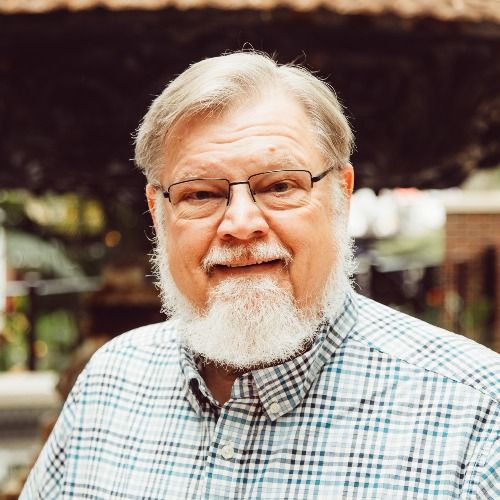Episode 936
The Weight of Privilege: Lessons from Luke 10:13-16
The "Daily Bible Refresh" is presented each day by Rev. Dr. Brad Miller who has a goal of speaking a bit of the bible into two million ears (one million people) in three years (2025-2028).
He is the author of "The A, B, C-1,2,3 Bible Study Guide" Free to you by clicking HERE.
Brad served as a local church pastor for forty years and has a background in radio and podcasting. Moreover, he is a life-long student of The Bible.
He believes in the words of Jesus that “scripture is fulfilled in your hearing” (Luke 4:21)
The "Daily Bible Refresh" is available seven days a week by 6:00 am ET. The episodes are no longer than ten minutes long and are...
- Understandable: A reading from the New Testament (usually the Gospel) selected from the Revised Common Lectionary using "The Message" translation.
- Relatable: You will have a couple of "points to ponder" from the text which will relate to your life
- Applicable: Every episode includes a way you can take action based on the reading
- A recommended resource to help you go deeper in biblical study and spiritual direction.
- A prayer for your day.
A companion resource to the Voice of God Daily Podcast is the “ABC Bible Study Guide” available by clicking HERE.
The "Daily Bible Refresh" is available every day at VoiceofGodDaily.com on Apple Podcasts, Spotify and all major podcast directories.
You can help Dr. Brad attain his goal of getting a bit of the bible into two million ears by subscribing to "Daily Bible Refresh" on Apple Podcasts, leaving a five-star rating, and writing a review. More importantly please share with your network of family and friends about the "Daily Bible Refresh".
Please make listening to the "Daily Bible Refresh" a part of your daily life.
Remember… “All scripture is God-breathed and useful”(2 Timothy 3:16)
A profound examination of the scriptural passage from Luke 10:13-16 is presented, wherein Jesus articulates a poignant message concerning the consequences of privilege and the necessity of collective responsibility. The discussion elucidates how cities such as Chorazim, Bethsaida, and Capernaum, which have been the recipients of profound divine interventions, remain untransformed in their spiritual states. This lack of repentance in these communities serves as a prophetic admonition, urging a reconsideration of the relationship between privilege and accountability. The speaker calls into question the complacency that often accompanies privilege, emphasizing that possessing advantages—be it through education, economic status, or social standing—imposes a moral obligation to effectuate positive change within society. Through the lens of this scripture, listeners are compelled to reflect on how they utilize their privileges to advocate for those who are marginalized and disenfranchised, ultimately confronting the dangers of spiritual arrogance that may arise from a misguided sense of entitlement.
Moreover, the dialogue delves into the implications of collective accountability, positing that the responsibility for societal injustices cannot merely rest upon individual actions but rather must be viewed through a communal lens. The exhortation to engage in a 'privilege inventory' serves as a practical exercise, encouraging individuals to identify their privileges and take actionable steps towards justice and advocacy. This approach not only fosters personal growth but also instills a communal spirit where transformation is sought not just at an individual level, but also as a collective endeavor. As the episode unfolds, listeners are invited to grapple with challenging questions regarding their roles in perpetuating or alleviating societal injustices, thereby promoting a more equitable and compassionate world.
The discourse presented in the podcast intricately weaves together themes of privilege, accountability, and the prophetic calls for justice as illustrated in Luke 10:13-16. By addressing the cities of Chorazim, Bethsaida, and Capernaum, the speaker underscores the stark reality of spiritual complacency in the face of divine grace and intervention. The cities, having witnessed numerous acts of divine love, are admonished for their unchanged hearts, a narrative that resonates deeply in today's socio-religious context. The speaker's insights challenge listeners to consider how their own privileges—whether they stem from socioeconomic status or educational opportunities—serve not only as advantages but also as responsibilities to advocate for the voiceless and marginalized.
A significant portion of the discussion is dedicated to the dangers of religious complacency, akin to Capernaum's presumption of divine favor. This discussion prompts a critical examination of how religious institutions may inadvertently cultivate environments of spiritual arrogance, neglecting their foundational mandate of service and compassion. The speaker's reflections inspire listeners to interrogate the extent to which they might be contributing to systemic injustices while believing in their benevolent intentions. In conclusion, the episode not only elucidates the scriptural text but also provides actionable steps toward community accountability, urging individuals to engage in meaningful self-reflection and collective action, thereby embodying the transformative message of the Gospel in their daily lives.
Engaging with the text from Luke 10:13-16, the podcast episode presents a compelling exploration of privilege and collective responsibility through the lens of biblical prophecy. The narrative centers on the admonitions directed towards Chorazim, Bethsaida, and Capernaum—cities that have experienced the manifestation of divine power yet remain obstinately nonresponsive. The speaker articulates that these prophetic rebukes are not mere condemnations but rather fervent calls to accountability and transformation. This perspective invites listeners to reflect on their own lives, particularly in relation to the privileges they possess, and the responsibilities that accompany such advantages.
As the discussion unfolds, it becomes evident that the themes of privilege and complacency are interwoven with the Christian mandate to seek justice and advocate for the marginalized. The speaker encourages an exploration of the dangers associated with religious arrogance, particularly how communities may become so entrenched in their perceived status that they neglect their commitment to service and compassion. Furthermore, the podcast emphasizes the importance of collective accountability, challenging the notion of individualism in faith by highlighting that the call to justice is a communal endeavor. By conducting a 'privilege inventory', listeners are urged to take concrete steps towards utilizing their advantages for the greater good, fostering an environment of shared responsibility and active engagement in the pursuit of justice. Through prayer and reflection, the episode ultimately seeks to inspire transformative action in the listener's life, aligning their privileges with a mission of love and justice.
Takeaways:
- In this episode, we explore the profound implications of privilege and the corresponding responsibilities that accompany it, particularly in light of Jesus' teachings in Luke 10:13-16.
- The dangers of spiritual complacency are illustrated through Capernaum's misguided belief in its promotion to heaven, serving as a cautionary tale for contemporary faith communities.
- Collective accountability emerges as a pivotal theme, challenging the individualistic nature of faith by underscoring the need for communal responsibility in addressing societal injustices.
- We are encouraged to conduct a privilege inventory, reflecting on our advantages and identifying actionable ways to advocate for marginalized individuals.
- The episode emphasizes that transformation must occur both personally and systemically to effectuate meaningful change in our communities and beyond.
- In conclusion, we recognize the necessity of utilizing our privileges for justice, acknowledging that our comfort should not come at the expense of others' dignity and well-being.
Links referenced in this episode:
Companies mentioned in this episode:
- voiceofgoddaily.com
Transcript
Dr. Brad Miller here on Daily Bible Refresh.
Speaker A:Your daily walk into the New Testament of the Bible from a progressive perspective.
Speaker A:We use the Revised Common Lectionary to read the selected verses for this very day for the New Testament.
Speaker A:We make it understandable by reading from the Message version, relatable by giving you some points to ponder and applicable by giving you some action steps to follow.
Speaker A:We make it.
Speaker A:We do it all in under 10 minutes or so with the prayer to boot.
Speaker A:It's all brought to you by voiceofgoddaily.com that's the home of the ABC 1, 2, 3 Bible Study Method.
Speaker A: , the audible word of God, by: Speaker A: reading for the day from Luke: Speaker A:Doom Chorazim, Doom Beth Seda.
Speaker A:If Tyra and Sidon have been given half the chances given you, they've been on their knees long ago, repenting and crying for mercy.
Speaker A:Tyre and Sidon have it easy on Judgment Day compared to you.
Speaker A:And you, Capernaum, do you think you're about to be promoted to heaven?
Speaker A:Think again.
Speaker A:You're on a fast track to hell.
Speaker A:The one who listens to me listens to you.
Speaker A:The one who rejects you rejects me.
Speaker A:And rejecting me is the same as rejecting God who sent me.
Speaker A:Short but powerful passage of Scripture here.
Speaker A:Do be sure we're exploring this challenging passage from Luke that speaks about accountability and privilege and collective responsibility in our work for justice.
Speaker A:So in this situation, Jesus is talking to some people who have witnessed his ministry, and yet they themselves have remained unchanged.
Speaker A:And these really aren't just angry condemnations, they're a prophetic calls to accountability.
Speaker A:And I think it really resonates deeply within our contemporary context.
Speaker A:So let's get into it.
Speaker A:Here's some points to ponder.
Speaker A:Privilege carries responsibility.
Speaker A:Jesus calls out these specific cities that have witnessed countless demonstrations of divine love, yet remain unchanged.
Speaker A:These privileged places centers of religious and economic power.
Speaker A:Today we might ask what responsibilities come with our privileges?
Speaker A:How are we using our access to what we have, education, influence to create positive change in the world?
Speaker A:The second point is about the dangers of religious complacency.
Speaker A:Capernaum's belief that they were about to be promoted to heaven reflects a dangerous spiritual arrogance in our own time.
Speaker A:How often do religious institutions become so focused on their own status that they forget their call to service.
Speaker A:How might we be perpetuating harm while believing we're doing good?
Speaker A:A third point is about collective accountability.
Speaker A:Notice that Jesus addresses entire communities, not just individuals.
Speaker A:This challenges our individualistic approach to faith and reminds us that transformation must happen at both a personal and a systematic level.
Speaker A:How are we collectively responsible for the injustices in our society?
Speaker A:And what does community repentance look like?
Speaker A:Okay, here's some action steps.
Speaker A:Conduct a privilege inventory.
Speaker A:That is, list maybe one to three specific privileges you hold, maybe at your educational level or your economic status or the race that you are.
Speaker A:For each privilege, identify a concrete way you can use it to advocate for those who don't share that advantage.
Speaker A:This isn't about guilt.
Speaker A:It's about responsibility and action.
Speaker A:We're going to close in a prayer in just a moment.
Speaker A:I did want to remind you that we have a great resource just for you.
Speaker A:It's called the ABC 123 Bible Study Method.
Speaker A:It will help you do your daily Bible study at home in coordination with what we do here on the Daily Bible Refresh.
Speaker A:You pick it up Free to you@voiceofgoddaily.com let's pray.
Speaker A:Oh God, you are the Divine disturbator, disturber of our comfort.
Speaker A:And we confess our tendency to rest in privilege while others struggle for basic dignity.
Speaker A:Wake us from our complacency, shake us from our spiritual smugness and move us to action.
Speaker A:Help us see that your judgment is not about condemnation, but about transformation.
Speaker A:Give us courage to use our privilege for the work of justice and wisdom, to listen to those we often ignore.
Speaker A:Make us instruments of your liberation, even when it costs us comfort.
Speaker A:Amen.
Speaker A:Well friends, great to be with you here at Daily Bible Refresh.
Speaker A:Daily Bible Refresh is completely list are supported by folks just like you.
Speaker A: lionaires a million people by: Speaker A:I just really want to encourage you to go to our website voiceofgoddaily.com you scroll to the bottom.
Speaker A:There's a place where you can give us a gift of any amount a dollar or more.
Speaker A:Every bit is helpful.
Speaker A:So go to voiceofgoddaily.com I'll see you again tomorrow.
Speaker A:We're here every single day to give you the Daily Bible Refresh.
Speaker A:Until tomorrow friends.
Speaker A:My name is Dr. Brad Miller.
Speaker A:Remember that God's loyal love doesn't run out.
Speaker A:His merciful love hasn't dried up.
Speaker A:It's created new every morning.



